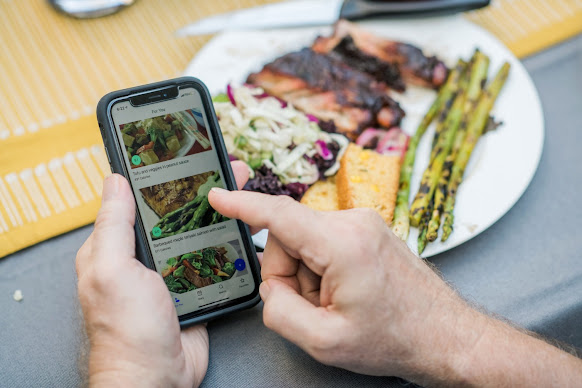''' '' HEALTH -ARTIFICIAL
INTELLIGENCE- HEAVES '' '''
ARTIFICIAL INTELLIGENCE : A WANNABE DIET BUDDY. Personalized apps, aimed at making healthy eating easier, are in some very early stages. Users should be wary of overly broad claims that go beyond predicting how foods affect blood sugar.
After 20 years of living with Type 2 diabetes, Tom Idema had given up hope of controlling his condition. He had tried many diets that proved unsuccessful and even considered weight loss surgery. When his employer offered him a chance to try a new dietary app that uses artificial intelligence to control blood sugar, he took it.
Mr. Idema, 50, sent in a stool sample to get his microbiome sequenced and filled out an online questionnaire with his blood sugar, height, weight and medical conditions. That data was used to create a profile for him, to which he added continued blood sugar measurements for a couple of weeks. After that, the app, called DayTwo, rated different foods according to how good or bad they might be for Mr. Idema's blood sugar, to aid him in making better food choices.
After nearly 500 days of using the program, his diabetes is in remission and his blood sugar levels have dropped to the upper end of normal. And even though DayTwo says the app isn't aimed at weight loss, he's gone from 320 pounds to 229 pounds.
''I'm wearing pant sizes I haven't worn since high school,'' said Mr. Idema, who is an administrator at Central Michigan University in Mount Pleasant, Mich.
DayTwo is just one of a host of apps claiming to offer A.I. eating solutions. Instead of a traditional diet, which often has a set list of ''good'' and ''bad'' foods, these programs are more like personal assistants that help someone quickly make healthy food choices.
They are based on research showing that bodies each react differently to the same foods, and the healthiest choices are likely to be unique to each individual.
Whether these A.I. nutritionists are ready for widespread use is still unclear, and there is very little research available from sources outside the companies selling apps. Users should be wary of overly broad claims that go beyond predicting how foods affect blood sugar.
BUT PROPONENTS SAY that blood sugar is just the beginning and that A.I. programs could focus on other aspects of metabolic health, such as obesity and heart disease, eventually helping to guide a person's everyday meal choices.
ARTIFICIALLY INTELLIGENT CHOICES : The DayTwo app uses an algorithm based on research by Dr. Eran Elinav and Eran Segal of Weizmann Institute of Science in Israel, who co-founded the company in 2015.
Last year, the company found that when they used their algorithm to match a diet to an individual's microbiome and metabolism, it was better at controlling blood sugar than the Mediterranean diet, considered one of the healthiest in the world.
''Rather than measuring foods by caloric content and trying to come up with a 'healthy diet,' said Dr. Elinav,'' you need to start measuring the individual.''
This technology is relatively new and only relates to blood sugar. The Mediterranean diet, however, has decades of research behind it and will likely remain the gold standard for healthy eating for years. Still, for people like Mr.Idema, A.I. like DayTwo's can make it easier to maintain healthy eating patterns.
The app's machine-learning algorithm can identify patterns and learn from data with human help.
It analyzes data from individuals 'blood sugar responses to tens of thousands of different meals to identify personal characteristics - age, gender, weight, microbiome profile and various metabolic measurements that explain why one person's glucose spikes with certain foods when another person's doesn't.
The algorithm uses these observations to predict how a particular food will affect one's blood sugar and assign each meal a score. Users can play around with food combinations to change the score for each meal.
''I thought they were going to say, 'Oh my gosh, you've just got to become a salad eater, and that's not been the case,'' Mr. Idema said.
Another company, ZOE, also generates meal scores and is available directly to consumers for $59 per month. Zoe's algorithm uses additional data, such as bad fat levels, in addition to microbiome and blood sugar tests.
The algorithm was able to predict how a person's blood sugar and fats respond to different foods in a large 2020 study led by one of the company's founders, Dr. Tim Spector, a professor of genetic epidemiology at King's College London.
Currently these algorithms mostly focus on blood sugar, but newer versions will incorporate more personal data, and, in theory, recommend diets that reduce cholesterol, blood pressure, resting heart rate or any other measurable, clinical indicator.
The Honour and Serving of the Latest Global Operational Research on Diet, Technology, and Future, continues. The World Students Society thanks author Sandeep Ravindran.
With respectful dedication to Scientists, Inventors, Innovators and then Students, Professors and Teachers of the world. See Ya all prepare and register for Great Global Elections on The World Students Society - for every subject in the world : wssciw.blogspot.com and Twitter - !E-WOW! - The Ecosystem 2011 :
Good Night and God Bless
SAM Daily Times - the Voice of the Voiceless

.png)


0 comments:
Post a Comment
Grace A Comment!